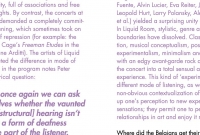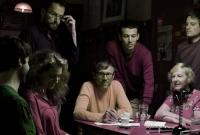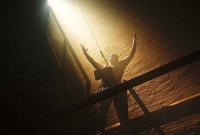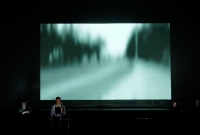A paper by Monika Pasiecznik, curator and searcher,
published first in ISCM's (International Society for Contemporary Music) magazine,
"World New Music Magazine", 2012 edition,
also available on Monika Pasiecznik's website
Artistic invasion: Belgians in Darmstadt 2012
Liquid Room – Listening and Drifting
The culmination and, at the same time, crowning of the Festival in Darmstadt took place on 28 July in the Darmstadium with a performance by Ictus Ensemble and guests: Jennifer Walshe, Matthias Koole and Stefan Prins. If the concerts of the Nadar Ensemble and Besides Ensemble were a manifestation of different, original thinking about music and the manner of its presentation, then Liquid Room was additionally a fulfillment of the idea of music in a space (as in a gallery?) which permits the audience to move about freely, permitting it to decide independently when and where it will join in the musical stream.
It is also an invitation to another kind of listening, more diversified, fragmentary, of differing intensity, full of associations and free drifting of thoughts. By contrast, the concerts at the Orangerie demanded a completely committed form of listening, which sometimes took on the hallmarks of repression (for example: the complete set of Cage’s Freeman Etudes in the rendition of Irvine Arditti). The artists of Liquid Room accentuated the difference in mode of listening, citing in the program notes Peter Szendy’s rhetorical question:
And once again we can ask ourselves whether the vaunted total [structural] hearing isn’t really a form of deafness on the part of the listener. Listening without the least deviation, without ever being distracted by the noises of life – is that even listening at all? Mustn’t listening permit certain shifts in focus?
In the expansive space of the Darmstadium, four stages were arranged facing the four corners of the globe, while in the middle stood a mixing table and the sound engineers’ stations. The audience took their places on portable cardboard seats in the space between the four stages and the sound engineers. Constantly changing sound vectors, flowing from different – and sometimes several – directions, immediately obliged the audience to become mobile.
It is difficult to reconstruct all twenty works performed at the Darmstadium in their detailed structural and aesthetic properties. The idea of Liquid Room’s artists did not consist, however, in dividing up, differentiating or pigeonholing music. The artists created a space which in and of itself became a work. The diversity of the elements forming it (among them, compositions by Clinton McCallum, Magnus Lindberg, John Cage, Bernd Alois Zimmermann, Benjamin de la Fuente, Alvin Lucier, Eva Reiter, Jennifer Walshe, Leopold Hurt, Larry Polansky, Alexander Schubert et al.) yielded a surprising unity of musical idea. In Liquid Room, stylistic, genre and generational boundaries have dissolved. Classical composition, musical conceptualism, Postmodernism and experimentalism, Minimalism and maximalism, with an edgy avant-garde rock as a finale, turned the concert into a total sensual and intellectual experience. This kind of ‘experiments’ with a different mode of listening, as well as a different, non-obvious contextualization of music, open up one’s perception to new experiences and sensations; they permit one to perceive the subtle relationships in art and enjoy it more fully.
Where did the Belgians get their ideas; where does their musical vitality come from? This year’s Festival and Courses for New Music in Darmstadt showed that today, they are a force to be reckoned with. Belgium is growing into an important center of contemporary music which, in the future, will have yet many surprises for us.
English translation: Cara Thornton
press





